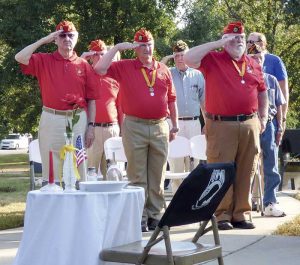A small table centered on the grounds of Patriot Park in Fayetteville on Sept. 21 carried high symbolism, and the reality, of the plight of the veterans still missing in Vietnam, Korea and other wars.
Above, the annual POW/MIA Recognition Day Ceremony was held Sept. 21 at Patriot Park in Fayetteville. Photo/Ben Nelms.
Local veterans groups from Fayette and Coweta counties were joined by a host of others, nearly 100 in all, for the 2018 POW/MIA Recognition Day Ceremony.
Speakers recalled their comrades whose voices remain silent as the decades pass. The occasion also came with state and federal proclamations, the wreath presentation and a chopper flyover by the Army Aviation Heritage Foundation.
As is always the case during the annual event, the occasion carried with it a solemnity that transcends time and touches the spirit.
As is customary at the yearly remembrance, the Missing Man Table, also known as the Fallen Comrade Table, was in place up front near the podium.
For those unaware of its significance, the empty table might bear little notice. But for those who understand, that table and its contents and the chair beside it means everything.
The small table is round to show everlasting concern for America’s missing men.
The tablecloth is white, symbolizing the purity of the motive when answering the call to duty.
The single red rose in a vase is a reminder of the life of each one missing, and their loved ones and friends who keep the faith, awaiting answers.
The vase tied with a red ribbon is a symbol of the continued determination to account for those missing.
The slice of lemon on the bread plate is a reminder of the bitter fate of those captured and missing in foreign lands.
A pinch of salt symbolizes the tears endured by those missing and their families who seek answers.
The Bible represents the strength gained through faith to sustain those lost from this country, founded as one nation under God.
The glass is inverted to symbolize their inability to share a daily toast.
The chair is empty — they are missing.
There are still an approximate 83,400 POWs and MIAs on the roles. That number includes 73,515 from World War II, 7,840 from Korean War, 1,626 from the Vietnam War, 126 from the Cold War and six from Iraq and other recent actions.
The only thing left to say is that the whereabouts of those still unaccounted for deserve to be known. They displayed the love for their country by serving and they deserve to have their nation display a similar love for them.
Their families, friends and comrades refuse to let their memories go gently into that good night.











Leave a Comment
You must be logged in to post a comment.